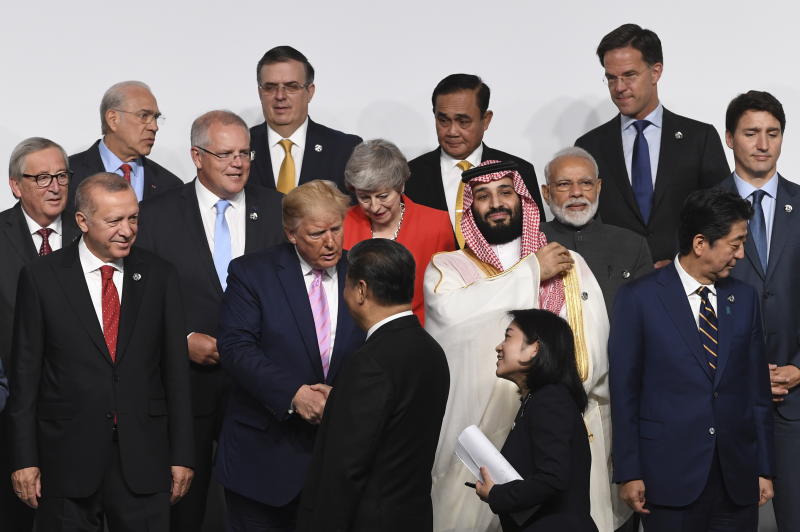Chinese state media keeps up criticism of US ahead of Xi-Trump meeting in Osaka
Sign up now: Get insights on Asia's fast-moving developments

US President Donald Trump greets Chinese President Xi Jinping as other world leaders look on during the G-20 summit in Osaka, Japan, on June 28, 2019.
PHOTO: EPA-EFE
BEIJING - There is barely a day to go before United States President Donald Trump and Chinese President Xi Jinping meet on the sidelines of the G-20 summit in Osaka to resuscitate failed trade talks.
But instead of urging both sides to cooperate and compromise, as it commonly does in the lead-up to such high-level meetings, the Chinese state media has kept up its criticism of the US.
This week, media outlets ranging from nationalist tabloid Global Times to the Chinese Communist Party's official People's Daily newspaper have published commentaries and editorials that attack the US' top diplomat Mike Pompeo, and its "maximum pressure" tactics against China.
Experts say the tone of the Chinese media, which is tightly controlled by the government, reflects the thinking of Chinese leaders, and suggests that Beijing remains cautious about the possibility of an eventual deal.
On Friday (June 28), the Chinese Foreign Ministry said at a briefing that teams from both sides were in close communication ahead of the Xi-Trump meeting, adding that it hoped the Americans would come together with the Chinese and "work together to push for a positive result".
In an editorial on Thursday, the People's Daily called the US "the international community's troublemaker" for pushing its unilateralist policies.
"Some people in the US have this fixed 'Cold War mentality', and believe in the idea of a 'zero-sum game'. They won't hesitate to harm the interests of other countries in seeking their so-called absolute security - this does not benefit global peace and security, and is not in line with the trend of the times," said the newspaper.
The nationalist Global Times was also unflinching in its criticism, writing in an editorial on Friday that using tariffs to pressure China into a deal would not work.
The escalating trade war between the two countries has already seen tariffs slapped on US$360 billion (S$487 billion) worth of goods from both sides.
Mr Trump has threatened to impose tariffs "maybe at 10 per cent" on the remaining US$300 billion worth of Chinese imports that remain untaxed, calling this his "Plan B" if negotiations peter out after the summit with Mr Xi.
"Exerting pressure on the other side before important meetings or negotiations is an old tactic that the US side often adopts. The Chinese side is overly familiar with their modus operandi, and will not fall for it," the Global Times said.
The Chinese state media has also published scathing commentaries against Mr Pompeo, the US Secretary of State.
The Global Times did this twice this week, calling Mr Pompeo the "complainer-in-chief", for canvassing international support against China.
"He is becoming hysterical, using his power to blend his personal anti-China will with US national policy," it wrote.
Unusually, one of the Global Times' articles was also featured during the primetime news bulletin of state news broadcaster CCTV, which usually reports content from state news agency Xinhua or the People's Daily.
Professor Shi Yinhong of Renmin University said after trade talks broke down last month, Beijing is now more cautious and recognises that the possibility of reaching an agreement in the short term is "quite low".
Observers widely expect both leaders to announce a restart of trade negotiations when they meet in Osaka on Saturday.
"Having negotiations doesn't mean both sides can reach a deal, the positions of China and the US now look to be too far apart," said Prof Shi, adding that Chinese media is reflecting Beijing's cautious expectations of a deal and preparing for a protracted trade war.


